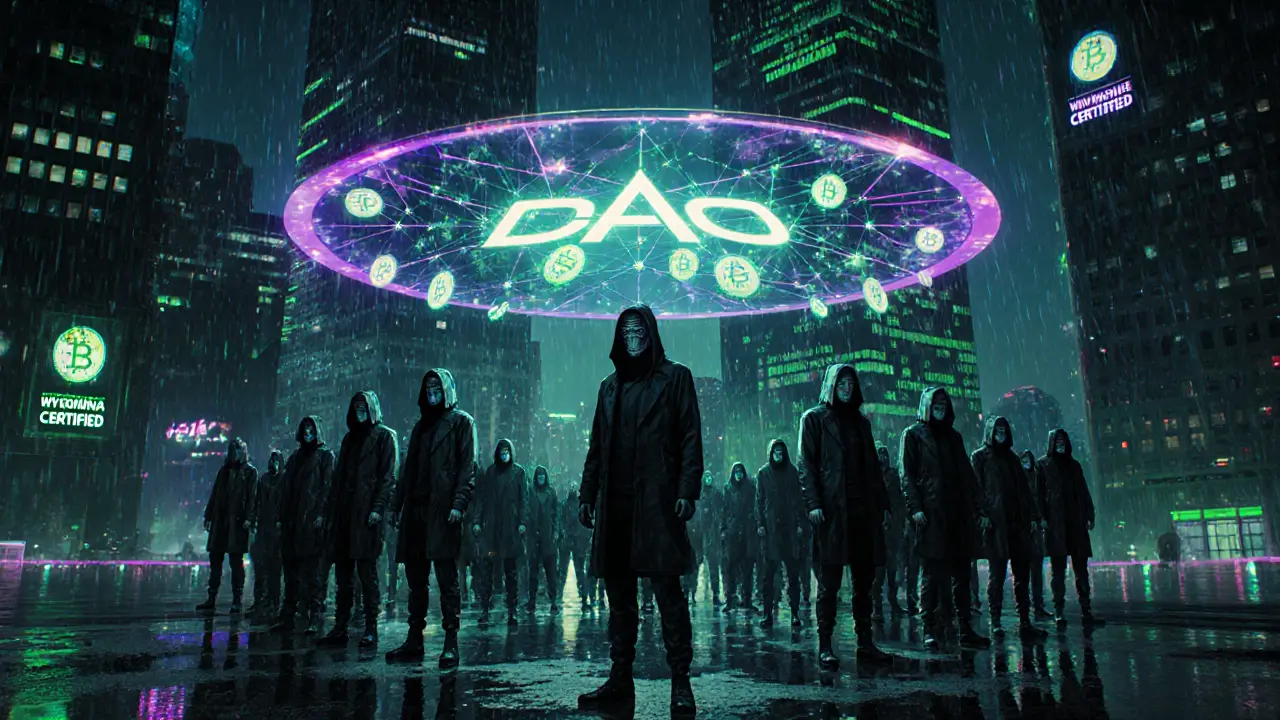Imagine a company with no CEO, no board of directors, and no office. No one owns it. No one controls it. But it holds millions in assets, signs contracts, hires contractors, and makes decisions - all through code and votes from people around the world. That’s a DAO. And in 2025, the big question isn’t whether they work - it’s whether they’re legal.
What Exactly Is a DAO?
A DAO, or Decentralized Autonomous Organization, runs on blockchain technology using smart contracts. These are self-executing programs that automatically carry out actions when certain conditions are met. Members join by buying governance tokens. Each token gives you a vote on proposals - like how to spend the treasury, who to hire, or what new features to build. Everything is public. Everything is recorded on the blockchain. No middlemen. No paperwork. Just code and consensus. But here’s the catch: the law wasn’t built for this. Traditional companies have names, addresses, registered agents, and clear chains of responsibility. DAOs don’t. So when something goes wrong - a hack, a bad vote, a breach of contract - who do you sue? Who pays? Who’s even in charge?Why Legal Status Matters
Without legal recognition, a DAO is just a group of people bound by code. That sounds cool until you try to open a bank account, sign a lease, or hire a lawyer. Banks won’t work with you. Insurance companies won’t cover you. Courts won’t recognize your agreements. And if someone sues your DAO, they might sue every single member - personally. That’s right. Your crypto wallet could be on the line. This isn’t theoretical. In 2022, the CFTC sued Ooki DAO for violating derivatives trading rules. The court didn’t ask who ran it. It treated the DAO as an unincorporated association - meaning every token holder could be held liable. That scared off a lot of people. If you’re holding 0.1% of a DAO’s tokens, are you legally responsible for its actions? In most places, the answer was: yes.Wyoming: The First Real Legal Home
Wyoming didn’t wait. In March 2024, it passed the Decentralized Unincorporated Nonprofit Association (DUNA) law. It was the first in the U.S. to give DAOs legal personality. That means a DAO registered under DUNA can: sign contracts, own property, sue and be sued, open bank accounts, and pay taxes - just like a corporation. But there’s a catch: it has to be nonprofit. No profit distribution to members. No dividends. No selling tokens for returns. That rules out most DeFi projects, NFT collectives, or investment DAOs. Still, it’s a breakthrough. DUNA requires at least 100 members to prevent founder-controlled shells. It also gives limited liability protection - meaning your personal assets are safe if the DAO gets sued. Early adopters in Wyoming say it’s working. One DAO managing community grants for open-source developers registered as a DUNA and now has a bank account, a legal name, and can hire developers under contract. They call it “the first real DAO that can do business.”New Hampshire: The Practical Approach
New Hampshire took a different path. Its DAO Act, effective July 2025, lets DAOs register as a new type of legal entity - not nonprofit, not LLC, but something entirely new. It’s called a “DAO entity.” Unlike Wyoming, profit distribution is allowed. Members can get paid. Tokens can be traded. The state is even building a public registry to list registered DAOs, their governance rules, and their smart contract addresses. This is the first time a U.S. state has created a tailored legal structure for DAOs that fits real-world business needs. It doesn’t force nonprofits. It doesn’t require physical offices. It just says: if you follow these transparency rules, you get legal standing. The Secretary of State is still finalizing the registration system, but early feedback from blockchain startups is positive. They see it as the most balanced model so far.
Virginia, Vermont, Tennessee: The Other Contenders
Virginia is pushing legislation to let DAOs register as Limited Liability Companies (LLCs) under existing state law. That’s smart. It uses a familiar structure - you get liability protection and legal capacity without inventing a whole new category. The catch? You have to file paperwork like any other LLC, including naming a registered agent. That’s a step toward centralization, but it works. Vermont’s approach is similar. It created the Blockchain-Based Limited Liability Company (BBLLC). It’s an LLC, but with special rules for blockchain governance. Members can vote on-chain. Minutes can be stored on the blockchain. It’s still an LLC, but optimized for crypto. Tennessee passed a law recognizing DAOs as legal entities under its Uniform Limited Liability Company Act. It’s less detailed than Wyoming or New Hampshire, but it gives DAOs the right to operate without being automatically treated as general partnerships.Malta: The European Model
While U.S. states are experimenting, Malta went all-in. Under its Innovative Technology Arrangements and Services (ITAS) Act, DAOs can apply for certification from the Malta Digital Innovation Authority (MDIA). Once certified, they get full legal recognition across the EU. That’s huge. A DAO based in Malta can legally operate in Germany, France, or Spain without worrying about conflicting rules. Malta’s system is strict. You need to submit your smart contracts, governance rules, and a detailed risk assessment. You must appoint a resident agent - someone physically in Malta who can receive legal notices. Some in the crypto community hate that. “It’s not decentralized if you need a person in Valletta,” they say. But for institutions - hedge funds, asset managers, venture firms - Malta is the only place in Europe where they can legally invest in a DAO.The Big Trade-Offs
There’s no perfect model. Each jurisdiction forces a compromise:- Wyoming: Strong liability protection, but no profits allowed.
- New Hampshire: Lets you make money, but registration is still being built.
- Virginia/Vermont: Uses existing LLC rules - easy to understand, but less flexible.
- Malta: EU-wide access, but requires a physical presence and heavy compliance.

What About the Rest of the World?
Most countries still treat DAOs as legal gray zones. In the UK, Australia, and Canada, there’s no specific law. DAOs operate under general contract or partnership rules - meaning members are personally liable. In Singapore, regulators are watching closely but haven’t issued formal guidance. Japan allows DAOs to register as corporations, but only if they meet strict corporate governance standards. China bans them outright. Russia has no clear position but has cracked down on crypto exchanges. Brazil and India are exploring regulatory sandboxes. The global picture is messy. That’s why many DAOs are choosing U.S. or Maltese registration - not because they’re based there, but because those places give them legal cover.What Should You Do?
If you’re starting or joining a DAO in 2025, here’s what to ask:- Do you plan to make money? If yes, avoid Wyoming’s DUNA.
- Do you need to bank, sign contracts, or hire employees? Then you need legal status - don’t rely on code alone.
- Are your members mostly in the U.S.? New Hampshire or Wyoming are your top choices.
- Do you want to operate in Europe? Malta is your only real option.
- Are you okay with giving up full decentralization? Then pick a jurisdiction that requires a registered agent or physical address.
The Future Is Still Being Written
The U.S. federal government hasn’t weighed in yet. The SEC hasn’t classified DAO tokens as securities. The IRS hasn’t clarified how to tax DAO distributions. The CFTC is still chasing unregistered ones. Until federal rules come, states and countries will keep competing. That’s actually good. Competition drives better laws. New Hampshire didn’t copy Wyoming. It improved on it. Virginia didn’t ignore DAOs - it adapted LLC law. That’s how innovation works. DAOs aren’t going away. They’re too efficient, too transparent, too powerful. The question isn’t whether they’ll survive. It’s whether the law will catch up - and fast enough to protect both the builders and the users.Are DAOs legal in the United States?
Yes, but only in certain states. Wyoming, New Hampshire, Virginia, Vermont, and Tennessee have passed laws giving DAOs legal recognition. In other states, DAOs exist in a legal gray area and may be treated as general partnerships, meaning members can be personally liable.
Can a DAO own property or sign contracts?
Only if it’s legally registered. In states like Wyoming and New Hampshire, registered DAOs can own bank accounts, sign leases, hire contractors, and enter into legal agreements. Unregistered DAOs cannot - any contract signed by a DAO member may be treated as a personal contract, putting their assets at risk.
Do I need to pay taxes if I’m in a DAO?
Yes. If you receive tokens as payment, earn rewards, or sell governance tokens for profit, those are taxable events in most countries, including the U.S. The IRS treats crypto as property. Even if the DAO isn’t registered, your personal tax obligations still apply. Registered DAOs may have to file entity-level taxes depending on their structure.
What happens if a DAO gets hacked?
If the DAO is unregistered, members could be sued personally for losses - as happened in the Ooki DAO case. If it’s registered under a legal framework like Wyoming’s DUNA or New Hampshire’s DAO Act, liability is limited to the DAO’s assets. Members are generally protected, as long as they didn’t act fraudulently.
Can I start a DAO in my country?
You can technically create one - the code runs anywhere. But without legal recognition, you won’t be able to open a bank account, sign contracts, or protect your personal assets. Most people register in jurisdictions like Wyoming, New Hampshire, or Malta for legal protection, even if they live elsewhere.
Why does Malta require a physical agent?
Malta’s law requires a local representative to ensure there’s always someone who can receive legal notices, comply with audits, or respond to regulators. It’s a trade-off: you get EU-wide recognition, but you give up full decentralization. This satisfies EU regulators who demand accountability - something purely on-chain DAOs can’t provide.
Is it better to register a DAO as a nonprofit or for-profit?
It depends on your goals. Nonprofit models like Wyoming’s DUNA offer strong liability protection and are easier to register, but you can’t distribute profits. For-profit models like New Hampshire’s DAO entity allow token holders to earn returns, but require more compliance. Most commercial DAOs choose for-profit structures.
Can a DAO be sued?
Yes - but only if it’s legally registered. Registered DAOs can be sued as entities. Unregistered DAOs can’t be sued directly. Instead, plaintiffs sue individual members, which can lead to mass litigation against hundreds of token holders. That’s why legal registration is critical for any DAO that interacts with the real world.
What’s the biggest risk of joining a DAO without legal registration?
Your personal assets. If the DAO breaks a contract, commits fraud, or gets hacked and can’t repay, you could be held personally liable - even if you only hold a small number of tokens. Courts don’t care if you thought you were just voting on a blockchain. If you’re a member, you’re a partner.
Will the U.S. federal government create a DAO law?
It’s likely, but not soon. States are moving faster than Washington. Federal agencies like the SEC and IRS are still studying how to classify DAO tokens and income. A federal law would require consensus across multiple agencies and Congress - a slow process. For now, state-level laws are the only practical option.


Astor Digital
November 18, 2025 AT 03:00So Wyoming says no profits but lets you sue and be sued? That’s like saying you can have a car but can’t put gas in it. Cool for nonprofits, useless for DeFi. I get why they did it-avoid SEC heat-but it’s like building a sports car and then taking out the engine.
Shanell Nelly
November 18, 2025 AT 06:37Y’all are overcomplicating this. If you’re building something real, just register in New Hampshire. It’s the only one that lets you make money AND have legal standing. No fluff, no nonsense. Wyoming’s cute, but it’s not for builders. Trust me, I’ve done both.
Aayansh Singh
November 19, 2025 AT 14:46Pathetic. You think state-level laws matter? The SEC doesn’t care if you’re registered in New Hampshire. They’ll still come for you with a subpoena and a class action. This whole thing is a legal theater. DAOs are inherently illegal because they can’t be held accountable. You’re just playing dress-up with smart contracts.
Rebecca Amy
November 20, 2025 AT 07:15Wow. So much text. I just wanted to know if I can get paid. 😴
Darren Jones
November 21, 2025 AT 11:08Important note: Even if you’re registered, if you’re actively managing the DAO-writing proposals, approving treasury spends, etc.-you might still be seen as a ‘promoter’ under securities law. Registration protects you from partnership liability, but not from SEC enforcement. Don’t assume you’re safe just because you checked a box.
Laura Lauwereins
November 22, 2025 AT 13:11So… Malta requires a person in Valletta? How is that decentralized again? 😏
Gaurang Kulkarni
November 23, 2025 AT 13:27Everyone is missing the point. DAOs are not companies. They are collective intelligence systems. Trying to fit them into LLCs or nonprofit frameworks is like trying to make a wave into a brick. The law is analog. DAOs are digital. You can’t regulate what you can’t define. The real question is whether the legal system is ready to evolve or if it’s just going to keep trying to stamp a square peg into a round hole until everything breaks
Nidhi Gaur
November 23, 2025 AT 18:45My friend started a DAO for meme coin dev and registered in Wyoming. Now they can’t pay devs in crypto without getting flagged. So they’re paying in USD via PayPal. Irony? Maybe. But at least the devs aren’t getting sued. 😅
Usnish Guha
November 24, 2025 AT 08:18You think legal recognition is the goal? No. The goal is to render the legal system obsolete. Why bother with state registries when you can have self-enforcing contracts? The fact that you’re even asking this means you’re still thinking like a 20th century bureaucrat. DAOs don’t need permission. They need time.
satish gedam
November 25, 2025 AT 15:47Hey everyone! Just wanted to say if you're starting a DAO, don't panic! Look at New Hampshire-it's the sweet spot. You can make money, you get liability protection, and you're not stuck with some old-school LLC paperwork. And if you're nervous, reach out to me-I’ve helped 3 DAOs get registered and they’re all thriving now 🙌 Let’s build together!
rahul saha
November 26, 2025 AT 16:39It's not about legality it's about ontology. The DAO is a new form of being-a digital polis. The state is trying to colonize it with paper and lawyers. But the code remembers. The chain doesn't forget. And someday when the last lawyer retires, the DAO will still be voting. 🤖
Marcia Birgen
November 27, 2025 AT 00:39Love seeing states actually trying to solve this instead of banning it! 🌟 New Hampshire’s model is so smart-no forced nonprofit, no overcomplication. It’s like they listened to builders instead of lawyers. If more places did this, we’d have way fewer DAOs fleeing to offshore tax havens. Keep going!! 💪
Jerrad Kyle
November 27, 2025 AT 18:36Wyoming’s DUNA is the quiet hero of this whole mess. Yeah, no profits-but think about it: if you’re running a community art DAO or a decentralized research collective, you don’t want to be a corporation. You want to be a cooperative. That’s the soul of DAOs. Profit isn’t the point. Trust is. And Wyoming got that. The rest are just trying to monetize consensus.
Usama Ahmad
November 29, 2025 AT 10:03Malta’s agent thing is sketchy but honestly? If I’m raising funds from EU institutions, I’ll take the agent. Better than getting frozen out of the whole market. It’s not perfect but it’s the only game in town right now. Gotta play the hand you’re dealt.